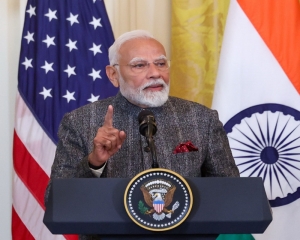With over 81 crore beneficiaries, the Govt is now leveraging advanced data-driven route optimisation tools as part of the PM GatiShakti master plan
The Government of India provides free food grains to more than 81 crore beneficiaries under the Pradhan Mantri Garib Kalyan Anna Yojana (PMGKAY) making it the largest food security programme in the world. This vast operation—from sourcing food grains from farmers to delivering them to ration cardholders—relies on a complex, decades-old supply chain. The Food Corporation of India (FCI), state procurement agencies, millers, transporters, warehouses, and Fair Price Shops (FPS) all play a critical role in this network. However, its design has historically been shaped by administrative convenience more than scientific optimisation. Supply routes were planned manually by state officials, a process prone to sub-optimality, bias and human error. In October 2021, the Prime Minister launched the PM GatiShakti Master Plan aiming to enhance multimodal connectivity and optimise logistics across the country.
One of its key pillars, “Optimisation,” envisions selecting the most efficient routes for transporting goods, thereby saving time and reducing costs. In line with this vision, the Department of Food and Public Distribution (DFPD) launched a national route optimisation exercise in March 2023, in partnership with the World Food Programme (UNWFP) and the Foundation for Innovation and Technology Transfer (FITT) from IIT Delhi.
This exercise, targeting the annual transportation of 6.8 crore metric tons of food grains through the PDS, marks a transformative step towards building a more efficient and cost-effective food supply chain. The process was comprehensive: geo-locations of warehouses and FPS, along with their capacities and road distances, were collected from each state. Using this data, custom algorithms were developed for each state to determine the most optimal supply chain routes. More than 50 physical workshops were held by DFPD and FITT officials to guide states in data collection and demonstrate the benefits of route optimisation.
These optimised routes were then validated on the ground to ensure they accounted for local conditions, and a state-specific intra-state optimisation tool was developed to allow for adjustments in the supply chain – such as adding or modifying entities like warehouses or FPSs. For instance, Bihar developed an annual movement plan based on its PDS requirements, food grain volume, and monthly transport routes. The customised algorithm factored in different possibilities of local procurement within the state and the grain required to be sourced from the FCI. This gave the state a clear view of its yearly logistics, allowing for cost-saving adjustments. By choosing the optimal option, Bihar reduced transport distances by 19 per cent, saving over Rs 3.09 crore per month. Similarly, Mizoram optimised its routes by eliminating unnecessary transfers of food grains between warehouses, achieving a 50 per cent reduction in distance and saving an estimated Rs 1.27 crore monthly. A significant milestone in this effort was the integration of the route optimisation tool with the GatiShakti platform, which now houses geo-locations of FPSs and warehouses across all states.
This integration enables the platform to generate the shortest possible motorable routes from FCI godowns to state godowns, and further from state godowns to FPSs.
The platform also allows real-time route re-optimisation based on updated infrastructure data (such as new roads) from other ministries. Since March 2023, route optimisation assessments have been completed for 30 out of 31 states, with intra-state route optimisation tools developed for 15 states so far. Early results from 12 states show tremendous promise, with transportation costs reduced by an estimated Rs 112 crore annually. Once fully implemented across all states, savings could exceed? 250 crore per year. This initiative is not only an economic win but also an environmental one. Global food miles—representing the distance food travels from production to consumption—account for nearly one-fifth of total food system emissions. Optimising India’s food distribution routes can contribute significantly to reducing CO2 emissions, aligning with the country’s climate change commitments under the Paris Agreement and its Conference of Parties (COP) targets. The reduction in fuel consumption will also help conserve foreign exchange reserves. Looking ahead, DFPD is exploring the possibility of earning carbon credits under the Carbon Credit Trading Scheme (CCTS), offering states an added incentive to complete the route optimisation process and earn tradable carbon credit certificates. This step would not only strengthen India’s commitment to a climate-smart supply chain but also potentially generate financial benefits. In conclusion, The integration of advanced technologies and data-driven tools is setting the stage for a smarter future in public distribution, one that safeguards both our resources and the planet.
(The writer is Secretary, Food & Public Distribution, Govt of India; views are personal)



























